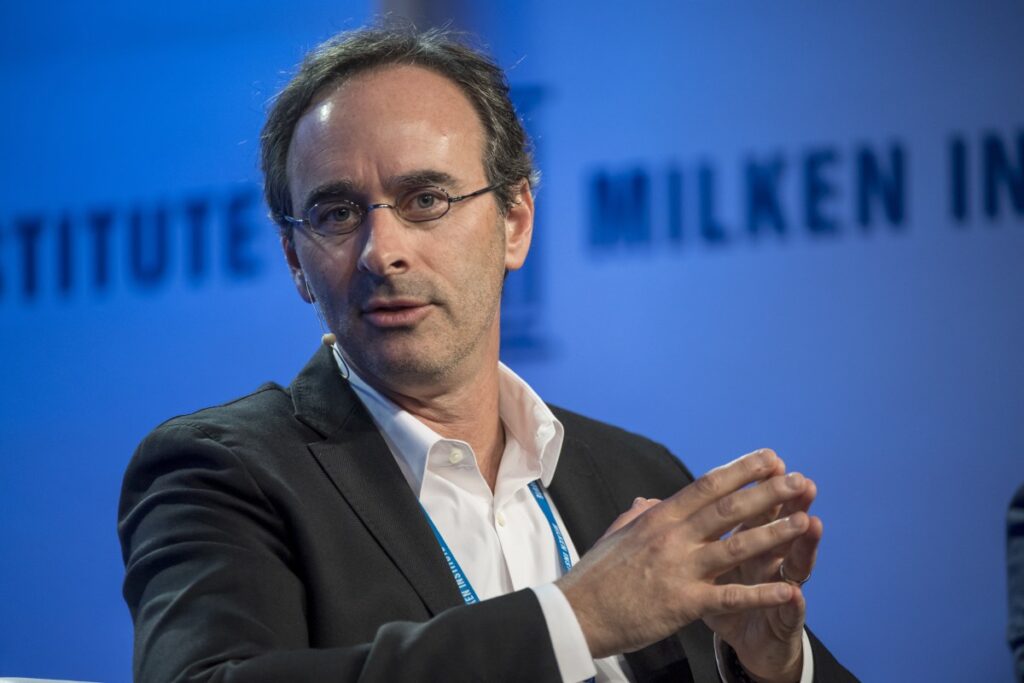Eric Lefkofsky is no stranger to going public: This will be his fourth time publicly listed. The serial entrepreneur, whose net worth is estimated at nearly $4 billion, has already taken three companies he founded public.
Today, he's the founder of Tempus, a genomic testing and data analytics company preparing for an IPO, but he's best known as the co-founder of daily deal pioneer Groupon, which went public in 2011 at a valuation of about $13 billion in one of the year's most high-profile debuts.
While Groupon's IPO and the years following it were notoriously troubled, the public offerings of two other companies he ran, InnerWorkings in 2006 and Echo Global Logistics in 2009, didn't raise much concern for investors and were good for Lefkofsky. InnerWorkings, a supply chain startup he founded in 2001, was sold to private equity in 2021 for a fraction of its IPO market capitalization.
Meanwhile, Echo Global Logistics' shares have risen steadily in value over the 11 years since it went public, and was sold to private equity in 2021 for 50% above its last trading price.
The controversy surrounding Groupon involves reports that Lefkofsky pocketed more than $300 million in Groupon's pre-IPO funding round, leaving the company with little working capital, and then roughly halved the revenue reported in an amended S-1 filing after regulators scrutinized the original S-1's financials. The unconventional decision also brought to light another of his past deals: In 2000, he sold a dot-com-era company, Starbelly.com, to a 50-year-old company that reportedly filed for bankruptcy a year later.
All of this has earned Lefkofsky a reputation as something of a man with golden hands, at least to himself, but maybe not to long-term investors in his company.
With Tempus, Lefkofsky is trying again to build a lasting, valuable company, which he reportedly founded in 2015 after his wife's successful treatment for breast cancer.
“I was troubled by how little data was being used in her care,” he told Forbes last year. “I became obsessed with the idea that technology developed for other industries could be applied to cancer care and help doctors make data-driven decisions.”
He stepped down as CEO of Groupon in 2015, when the company's market cap had fallen to $2.6 billion (Groupon's current market cap is around $600 million). At the time, Lefkofsky was focused on early-stage venture firm LightBank.
Interestingly, Tempus' S-1 filing states that he hasn't received a salary for the past two years (the S-1 does not provide any executive compensation for more than two years). However, the filing also states that he is set to receive an $800,000 salary and an $800,000 bonus beginning in 2025. And while he's not receiving a salary, he received $5.3 million in dividends from his company stock this year, according to the prospectus. The filing also states that Tempus covered the expenses of $7.5 million worth of preferred stock issued to him and paid $200,000 for his private jet.
Tempus is projecting revenue of $531 million in 2023, up 66% from $321 million in 2022. But the company is still bleeding cash heavily, projecting net losses of $265 million in 2023 and $196 million in 2022. One silver lining on the financial front, however, is that its operating loss margin is shrinking from 83% in 2022 to 37% in 2023, according to the S-1 filing.
Tempus also has a deal with another company founded by Lefkofsky, Pathos AI, a drug discovery platform founded in 2020, where Pathos is paying Tempus for the rights to license its data, while Tempus COO Ryan Fukushima is also Pathos CEO and splits his time between the two companies.
There are other signs that Mr. Lefkofsky wields more power than usual at Tempus.
Tempus has yet to complete its table of major shareholders, revealing only that Lefkofsky is one of them and owns at least 5% of the company, but the billionaire clearly wants to retain full control of the company after it goes public. Tempus is giving Lefkofsky's shares a staggering 30 votes per share. While multiple voting stocks are not uncommon, 10 votes per share is more common and 20 is considered high. So this is an unusually high shareholder influence for a healthcare CEO, and it will remain to be seen whether this is reduced in the upcoming S-1, i.e. whether potential investors frown upon it.
But Tempus' S-1 may not be overstating just how important Lefkofsky is to the company's future: A healthcare VC who has invested in genomics and data analytics companies told TechCrunch that Tempus wouldn't have grown to the size it has or raised so much money without Lefkofsky's marketing and fundraising skills.
Tempus has raised $1.42 billion in funding from investors including his own firm LightBank, as well as NEA, Revolution Growth, T. Rowe Price, Novo Holdings, Franklin Templeton and Baillie Gifford. The company's valuation was last reported at $8.1 billion in October 2022. Tempus' S-1 filing also states that the company recently received $200 million from SoftBank.
Regardless of how much Tempus raises in its IPO, the company's prospectus states that it's still far from breaking even and will “need to raise additional capital in the future.” Most unprofitable companies include this detail in their prospectuses, but investors may expect Tempus to eventually go public, which could put a strain on the stock price.
Tempus is positioning itself as an AI company, even though AI revenue will only account for about 1% of its total revenue in 2023, or $5.5 million.
“Tempus appears to be betting on the growth and opportunity of AI in life sciences, but I don't think it has proven itself yet with its current offering,” the healthcare investor said.
“While our AI product line is still in its early stages, we intend to incorporate AI, including generative AI, into all aspects of our diagnostic tools,” the company said in its S-1 filing. Tempus declined to comment beyond what was stated in the S-1.


